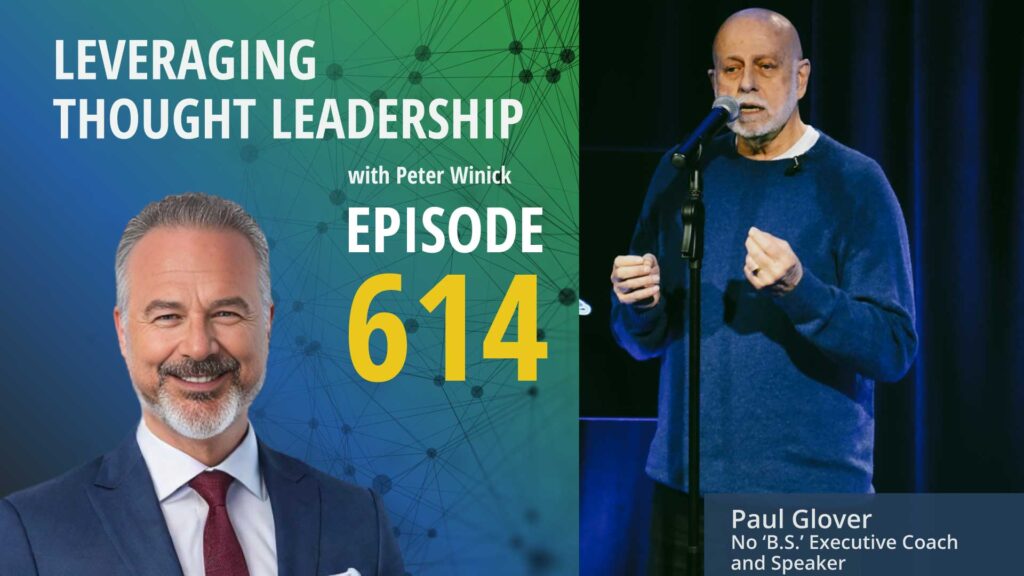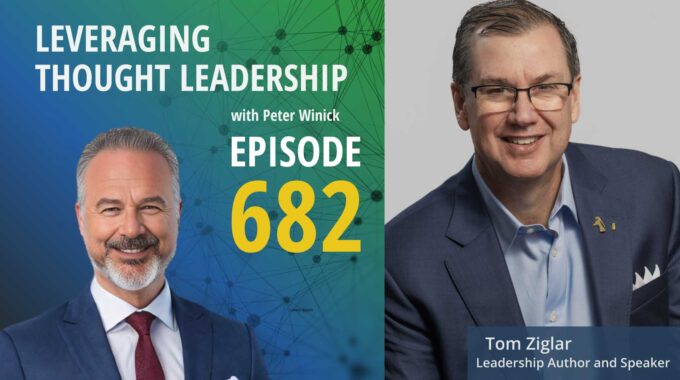A Hybrid Model That Blends Capability Building with Business Outcomes This episode explores how to…
The Transformative Power of Failure | Paul Glover

How Humility and Hard Truths Shape Authentic Leaders
In this episode, Peter Winick interviews Paul Glover, a former trial lawyer turned C-suite coach, who shares his extraordinary journey of transformation. After serving time in federal prison, Paul reinvented himself, using his hard-won lessons to develop the “No BS” coaching method. He discusses the power of resilience, embracing failure as a growth tool, and breaking free from leadership echo chambers. Paul’s candid insights challenge leaders to seek honest feedback, confront their blind spots, and lead with authenticity and humility.
What does it take to truly transform and lead authentically?
Paul Glover knows. Once a successful trial attorney, his life unraveled due to choices that led to federal prison. But from the depths of failure, Paul emerged not only as a survivor but as a powerhouse coach for C-suite executives. His journey is raw, unfiltered, and deeply inspiring, blending lessons of humility, resilience, and hard-won wisdom.
Paul’s story is one of dramatic reinvention. Prison, he says, saved his life and softened his perspective, forcing him to confront blind spots and triggers that once drove destructive behavior. Today, his “No BS” coaching method empowers leaders to tackle their echo chambers and embrace failure as a growth tool. From offering money-back guarantees to positioning himself as a modern-day “fool” who tells leaders the hard truths, Paul’s approach is anything but conventional.
Leadership, Paul argues, demands the courage to fail and the humility to learn. His coaching and speaking emphasize resilience, not just to bounce back but to bounce forward. Drawing parallels to psychological safety and historical figures like the court jester, Paul challenges leaders to seek and trust those who hold them accountable, creating space for transformation. The key? Being brutally honest—with themselves and their teams.
Paul’s message is a wake-up call to leaders everywhere: true leadership isn’t about being perfect; it’s about embracing imperfection and turning failure into fuel for growth. With humor, candor, and authenticity, Paul Glover inspires audiences to rethink success and take bold, transformative steps forward.
Three Key Takeaways:
Transformation Through Failure: Paul Glover’s journey from a successful attorney to a convicted felon and then a sought-after coach highlights the power of embracing failure as a tool for personal and professional growth. He demonstrates how confronting blind spots and taking accountability can lead to profound transformation.
Authentic Leadership Requires Honesty: True leaders need to break out of echo chambers and surround themselves with people who provide honest, unfiltered feedback. Paul’s approach as the “No BS” coach underscores the importance of humility, self-awareness, and the willingness to hear hard truths.
Resilience Goes Beyond Recovery: Leadership isn’t just about bouncing back; it’s about bouncing forward. Paul emphasizes resilience as the ability to learn from failures and turn them into opportunities for growth, fostering a leadership style that is both dynamic and transformative.
Instead of running from his past Paul has put it forward as part of his authentic self. When you present your thought leadership are you being authentic or just trying to go viral? Check out this short video by Peter Winick to discover why being your real self is more important.
Transcript
Peter Winick And welcome, welcome, welcome. This is Peter Winick. I’m the founder and CEO at Thought Leadership Leverage. And you’re joining us on the podcast today, which is Leveraging Thought Leadership. Today, my guest is an old friend, Paul Glover. Paul is a fascinating guy. He’s an author. He’s a coach of the no BS coaching method, if you will. He’s working on some new IP and speaking around Failing Forward and an all-around fascinating human being on lots and lots of levels and an all-around good guy. So welcome aboard, Paul. What’s going on?
Paul Glover Peter, thank you so much. You guys, you left out what I consider to be a defining element of my of my personality, my career. I’m an ex-lawyer, a recovering lawyer and an explorer.
Peter Winick Yeah. I was going to bring that up, too. Yeah, right, right.
Paul Glover I wanted to make sure you hadn’t forgot.
Peter Winick You know, I. You try not to have attorneys on. They offend me. The ex-felon piece. I couldn’t get a in.
Paul Glover Right off. Well, by the way, a recovery, Titania, you know. We’re just about acceptable.
Peter Winick They’re so. So let’s go. I mean, I know your backstory, and I find it just an amazing story, but maybe it’s got all the drama, right? Eventually it’ll be a movie of redemption, and I don’t want your this and all that. So give us a version of the Paul story.
Paul Glover Sure. A successful trial, a federal court trial attorney in the city of Chicago, then head. Because of my client base, I associated with some unsavory people to be kind. And the problem with associating with on February people is they expect you to be unsavory and to belong to that group. And I wanted to I did not join a lot of groups, but this what attracted me. And one of the problems with being a trial attorney is you’re an adrenaline junkie. Yeah. Preparation for trial is odorous. For every hour you’re in the courtroom, you’re doing four hours of crap. But once you’re done, the adrenaline high starts to go away and you crave another shot. Well, this group of clients and ex clients gave me that opportunity. Of course, the problem with joining a club is they expect you to be a member in good stead. And there their requisite for that was yeah do commit crimes and I committed 33 white collar crimes. That was what I was charged with. Found guilty in a federal court and sentenced to seven years of incarceration in a federal prison. Then five and a half years took my case to the Supreme Court, got a sentence reduction, and then got out and found out that I’d never practice law again, which was my passion, but also was transformed by prison. I tell people who hasn’t actually softened me, most people say, my God, you go to prison, must make you hard. Prison did two things for me. First, it saved my life, right? No question. If I had gone to prison, I would be dead a long time ago. And the second is saw for me, it made me realize that I wasn’t the smartest guy in the room. And that I had many blindspots and triggers and that if I didn’t transform myself, I was not only going to lose my family, but probably get out of prison. And as with most people who are in prison, I would go back to prison. Recidivism rate in the United States is over 70%. And so I made the decision to transform. You can’t transform by yourself, by the way. I had to lose the support of my wife and friends and it took me a long time. I spent the first two years of prison engaged in revenge fantasy. Yeah, I was that evil with everyone who put me up first. And at the end of that, I got out and found out that I couldn’t get a job because I was over the age of 50 and I had an index card, so I thought I’d take my skill sets. Good storyteller. Because with jury experience and also critical thinker, but also the guy who had who had gained humility and gratitude the hard way. And I put it together in a coaching program and started reaching out and eventually started to coach people in the C-suite.
Peter Winick So just stay there a minute. I love the way you just said. And just decided to coach people in the C-suite. Like people in the C-suite are sitting around waiting to get an email or a call from an ex-con saying, I know more than you do. I’m going to coach you through. Arrogant CEO.
Paul Glover There’s something that’s the way it happened. Well, it’s not the way it happened. You know, I started I started reaching out because I had an extensive I had a that’s a list of people I knew that was my law practice, which virtually a lot of there were associated with that. But I would tell people what are my characteristics is I’m tenacious. Yeah. And so I just kept at it and add it and add it until finally I had a person, by the way, I, I decided I had to do things differently. I wasn’t going to get I should get a coaching. Yeah, but, but I was going to do some things that other coaches did, Bill. First I was going to offer a money back guarantee. We would agree upon an action plan when we enter and to coaching relationship. And at the end of the year, we have not reached those goals. I did to pit right.
Peter Winick Which in the coaching game you know that not that there’s a lot of blame. But taking that level of risk and responsibility and skin in the game.
Paul Glover There we go.
Peter Winick Is fairly sure.
Paul Glover I do. And I believe we should. I understand coaching is I’m giving you my experience. I’m giving you my time, my energy. But the reality is that the skin in the game to me. What to the monetary aspect of it? Yes. I truly believe that if I don’t provide value, I should get pay. And who should decide that is not me. It’s the client. Of course I’m not a complete idiot. We set it up so that the person I was coaching was the only person who made the decision. We would do a 360 rereview at the very beginning and we didn’t want it The. Right. And that would show improvement. And by the way, it worked very well. And also, I built myself as the no Bias coach. And one of my clients gave me a reference that we give you. He gave me to it because I said I’d like some references for other client pension plans. He said, Absolutely. He said, Paul’s like an acquired taste like cyanide. So I said, I’ll take what he used out. She said, All right, here’s the one that you use. You said, Paul’s a Sherpa. Yeah. Get you to the mountaintop. But he will not carry your pet. And.
Peter Winick All right, coach. So I want to go because I know a lot of the story to. You now wind up with a successful coaching practice. And again, I think all coaching is an acquired taste and there’s a self-selection in that process. Somebody wants the soft cuddly. Probably not going to go to you. Somebody wants to somebody to give them direct. Somebody doesn’t really know what they want, but there’s a trust and respect and they say, I know this guy could be my Sherpa and call it like it is. But then you decide to write a book, right? And then then you decide to sort of go a little bit more transparent and go on a little bit of a different direction fairly recently on your speaking side. And I know a lot of this does you and I have known each other for, what, probably ten plus years or so? Yeah. Tell me a little bit about so you wake up one day and decide I’m going to write a book and then talk about how you get more transparent after a while.
Paul Glover Well, first, the book is, it was a terrible ordeal of. But I got through it and it was not the book that I should have written. I was told when I got out of prison, Don’t tell people who you are. Because that’s going to turn them off. If you want to get work, you’re going to have to tell a while. And I you know, I bought into that for a while. Then I decided there was this thing called Google. And if you wanted to know about me, all you had to do was go away. So I was like, Well, this can’t be a secret. Anybody is going to do work with me that has a brain. And so I said, okay, I need to I need to expose myself. But I didn’t do that with the book. The book is still a decent book. It’s actually much more relevant now than it was. But it wasn’t enough. And I decided that then I’ve got a message and I need do I need to spread the message? There’s a part of me that needs to pay back. Yeah. I was given every opportunity to be successful, and I was. And I blew it. Yeah. And I thought, well, the strawberry important message that not only leaders, but everyone should accept as understanding how they are making the mistakes that will destroy or define their life. So I did a Ted talk. Everyone needs a pool in their life. Yeah. Carpool. Let us know, by the way, that my. As my wife told me what you had to explain A joke. It’s not boring ahead. So she said nobody is going to understand what you read by this. Right? And they thought to me, 105 applications to get a Ted. I, like I said, tenacity. But the concept was that in medieval times, the king was anointed by divine light. Anybody who challenged the king committed heresy. However, the pool, the person that if we see a picture of setting a dead dressed garb, getting dressed up to some old joke, the gesture. But that was what the pool that was the role of the pool, because the pool was looked at as a crazy person. They were exempt from the rules of heresy. Therefore, they could tell the king the truth and not get their head cut off. They had psychological safety, right? I looked at that and I said, every leader needs a walker pools because leaders live in their own echo chamber when they say it’s lonely at the top. That’s because leaders choose to make it that way. Well, but.
Peter Winick Stay there a minute. So often times, you know, and I see this a lot, people that are in the C-suite and even when they come out, after all of a sudden their jokes are funnier. All of a sudden their ideas are better. All of a sudden, everybody’s got an agenda that they’re not as transparent about why they want to get, you know, they got a cup of coffee is not a cup of coffee. It’s I can I have three minutes to, you know, manipulate you, whatever.
Paul Glover Right. We are.
Peter Winick And there aren’t a lot of people, you know. I like that. You know, the jester is role. The function was to call BS, if you will. Yup. Inside of an organization. I mean, there are a lot of people that have the trust and the rapport and they have that conciliatory type person. But there’s a calculated risk you’re making to tell the CEO like, hey, dude, or do that whatever that new initiative that you’re rolling out really stupid, it’s going to fail. And here’s five reasons why do it that information what you will. Right.
Paul Glover Absolutely. Yeah. And you’re right. The echo chamber of caution is exactly as you describe it, is comprised manipulators of sycophants. Yeah, they’re there. They become there. And by the way, you ask everyone if it’s an echo chamber, at some point you start believing, Yeah, what you hear. And by the way, that’s why I’m successful is what I do. I provide that objective perspective that says, That’s stupid. Don’t do that. And again, the psychological safety is there. So every leader needs a flock of fools. You need people who do exactly that. They may be a mentor. They may be a coach. But it doesn’t matter what it is.
Peter Winick If you’re enjoying this episode of Leveraging Thought Leadership, please make sure to subscribe. If you’d like to help spread the word about our podcast, please leave a five-star review at ratethispodcast.com/ltl and share it with your friends. We’re available on Apple Podcasts and on all major listening apps as well as at Thought Leadership Leverage dot com. Forward slash podcast.
Peter Winick Don’t go back because when you started to put this fool’s idea out in the keynote, you did a bit of a 180, right? In terms of the transparency to getting in front of it, etc. you telling your story in a very open. And I remember when you were first doing it a few years ago, very open, very vulnerable way in terms of not just coming up with a concept by talking about, well, why you needed a fool and now you are one. You feel like.
Paul Glover One. Yeah. Yeah. And that. Yes, I thought my contention is if you want to be a coach, it’s great to have a certificate. It’s great to your knowledge. I believe you’ve got to have experience. And if you’re going to talk to a leader about this topic. I think you have had to experience the failure. And I said, I’ve done this and it was self-destructive. So I took it and I put it together. And yes, you’re right, extraordinarily, extraordinarily vulnerable and authentic. And I remember my wife we’re going through a practice session. Right. And she’s in the audience. And they were filming me. Yeah. And I get on stage, and I break down because I’m just going about my family. And, you know, I left Cabanatuan destitute, but also emotionally devastated. They cannot look. And so, we’re on the way back to the airport. And I’m saying that we’re just a complete disaster and natural to be able to use the video. And she’s looking out the window and she looks over and she says, cheaper than therapy. And that’s what has become the concept that I can get on stage and talk about the still emotional, still authentic, still vulnerable about it because it goes so deep. It’ll always be there. But that now becomes a part of the process that makes it makes a real or a leader to hear. When I step in front of a leader and say, You cannot fucked up your life any more than I have and why? So let’s be honest with each other. Because by the way, I’ll know if you’re not we’re not a not honest with me. We’re dull.
Peter Winick Right? There’s no point.
Paul Glover Well, absolutely, because I’m completely honest with you. And so it works. Once they realize that I build more misery than they ever could. They’re like, okay, I guess I could tell you about the things that cause me to want to bail. And that’s the problem with success, the paradox of success. Once we’re successful, we have to keep being successful as a leader. And at some point, the burden will break. You got to learn how to deal with it, which means you have to be willing to not watch failure but not run away from it. Those are learning experience, right? That’s where we learned being successful. Unfortunately, we stay in our comfort zone. You have to step outside. Interesting research has shown that if you’re not failing 16% of the time, you’re not going to continue to be a successful leader.
Peter Winick What was the percent? Was it six
Paul Glover 61.
Peter Winick 616? Okay.
Paul Glover Leaders hate hearing that, but it’s the truth. You keep in your comfort zone as a leader. Does it work? So anyway, that’s what I bring to it. And the conversation, that’s what my speaking is about. Now, about daily forward, about how you embrace failure as a part of the leadership journey. It’s there. It’s going to get you. If you think you are invaluable to the Black Swan, you’re not the Black swan.
Peter Winick So there’s a lot that we can learn from the success and the successes of others and best practices. And, you know, you should study other people in your field clearly. But I would agree with you that when you actually have an honest conversation with leaders or folks that are perceived as incredibly successful and you get them to be honest about their failures, they’re somewhat proud of them because they say that if it wasn’t for that, I wouldn’t be this. If I didn’t do that, this never would have happened if we didn’t experience that pain or the, you know, whatever, bet the ranch on the wrong thing or whatever it was. And the learnings. And I love that. You know, a lot of what you get in coaching is, well, why the hell would anyone listen to that guy or gal? Okay. So, you know, to your point, like, okay, you want to you want to talk about failure five and a half years in the. Can we tell you about failure? Right. You want to like, okay, so you’re worried about a product launch won’t hit 12% market share hit 11 haha. But by beer, right? yeah.
Paul Glover Absolutely. So. yeah, that’s where I’m at now. It’s, you know, I’ll see what the speaking career goals. I enjoy the stage. I’m pretty good at telling the story, but I also have a message that that should resonate with leaders. Hopefully it does too, because I think it’s a necessary metric. And what that’s aborted now, it’s everybody’s out there and you have to come to some realization about the concept of, yes, there will be failure, how you embrace it and then how you recover from it. And the concept of resilience to me is everybody’s resilient who’s a leader. When I talk to a leader, they’ve already managed to become resilient. Yeah, If you’re not, I think that it’s one step. And then the concept is put out now by Talib and yes. Agility. That to me is, is where leaders need to look. Not only should you recover, you should be able to take this experience, turn it into something that makes you better so that you bounce forward.
Peter Winick But there’s a lot of work also not to go too far down this rabbit hole. I’m post-traumatic growth syndrome. Everybody talks about post-traumatic stress, which is a clear thing, but what they don’t talk about is post-traumatic growth. Not that you wanna go through the trauma only for the objective of getting the growth, but a lot of people do experience some sort of transformational growth post trauma.
Paul Glover They go and obviously that’s what you’re looking for. And by the way, the concept of course is so psychological. Yeah. So, so anyway, that, that that’s where I’m at in this, in this concept of being in front of CEOs because I want to be in front of the people who have the opportunity and the position authority to institute change, which means they now have to turn around and look at their people and go, Yup, this applies to me. I want it to apply to you. Yeah. So. So that so that people now start to have the psychological safety to go to the leader and go, Hey, this is a weird idea. My work, if it fails, are you going to go away? And the answer is absolutely not.
Peter Winick No, I loved that. And the last piece I want to touch on is you’re really a master at this is that people come into, whether it’s coaching, advising, consulting, speaking, whatever, and they want to be all things to all people. Once you can really embrace the concept of self-selection like, Hey, you’re an acquired taste, just forget about your style. You’re this, you’re that. Like some people want to be coddle. Don’t call Paul. Some people might be offended by his history. Great. Paul. Paul Right. But like, I think everybody needs to think about the self-selection. Who are the types of people, the avatars, psychographic and demographically that I want to serve. And I can make a living at serving. And if it means I’m excluding 80, 90, whatever percentage of the universe, that’s awesome too.
Paul Glover And you and your spot on her beer, 80% of the people are referred to me. We don’t do business. Yeah, because I recognize right away that you’re not going to commit to the work. The concept of coaching is now gotten into life coaching, which I absolutely don’t do. And in it, if you don’t understand what it is, when you’re a leader and you’re being coach, it’s hard work. Yeah. And you have to commit to it. And I find it so interesting, I because of this, I’ve got I’ve got 58 people in my coaching program and when other coaches, that’s absolutely impossible, insane. You can’t possibly do them justice. And my response to them is that’s because you haven’t selected appropriate.
Peter Winick Right?
Paul Glover Every coaching call that I. There’s always an exception. There’s an exchange of energy. If you’re if you’re not a bad client. They’re an energy shock. And. And you will end up they will drain you like a vampire. First, they want you to tell them everything. They want you to share. They want you to be bold, but they don’t want to do anything with them. Right? So I refuse. I refuse to engage. The nice thing about my clientele is that there’s an exchange of energy. Well, the time I get out for coaching call, I’m usually as helped up as I hope they are. I mean.
Peter Winick Which gives you that which enables you to sustain having a practice that’s bigger than most because. Absolutely. How many cons I’ve talked to a lot of coaches. my God, I had five coaching sessions. Today I’m drained and I’m thinking, Well, that’s pretty crappy. That’s pretty, you know, And you get it. Like you might get one client that’s had an a bad experience or there’s empathy or whatever, whatever. But like, if that’s a consistent pattern, something’s broken. If you’ve got the wrong people or you know something, no approach.
Paul Glover Right. But, but and by the way, I’m not saying it works for everybody or. Yeah, and it does for me. And you’re right, I do self-select and therefore it’s a comfortable relationship, but it’s also an authentic relationship. We’re willing to we’re willing to share and they’re willing to commit to doing the work.
Peter Winick Yeah.
Paul Glover And therefore we’ll actually.
Peter Winick Commit and do. A lot of people commit to a lot of things. Right. But commit and you’ll hold them to.
Paul Glover Know I’m I’ve got a rigid plan here every other week we’ve got it. We have action steps that are going to be achieved in three areas. One, you better be taking care of yourself physically. I don’t want you in the program. And that something changed, Right. The pandemic convinced me that leadership and physicality are synchronized cannot be avoided. So you better be getting enough sleep. You better have a diet that makes some sense. I’m not trying to tell you I’m the food. Please. But I know that if you’re 30 pounds overweight, you need to lose weight. Yeah, And I want you to get exercise. All of this I can show scientifically. Yeah. Makes you better leader. So if you don’t commit to doing that, why are we in the program? Which you say you be mediocre. I’m okay with that because apparently you are. So we’ve got there. But we also have what do I want to achieve that creates my legacy? If you need communication coaching, I don’t waste your time with me.
Peter Winick Okay.
Paul Glover I get it. No, I’m not going to do it. I want to talk to you about your legacy. Yeah. I want to know what? I want to know your three year plan. I want to know what you’re going to do so that when you step off the stage. They’re going to remember you. Yeah, we were going to say I’m where I’m at because this person helped me to come up to me, cared about me.
Peter Winick Right.
Paul Glover That’s the kind of coaching that I’m involved in. And it works.
Peter Winick I love it. Well, this has been awesome, Pop. Appreciative that you came on today and tell your story.
Paul Glover Yeah. Well, great. Peter, thank you so much. As always. It’s a pleasure to talk to you.
Peter Winick Thank you. To learn more about Thought Leadership Leverage, please visit our Web site at ThoughtLeadershipLeverage.com to reach me directly. Feel free to email me at Peter at ThoughtLeadershipLeverage.com. And please subscribe to Leveraging Thought Leadership on iTunes or your favorite podcast app to get your weekly episode automatically.





